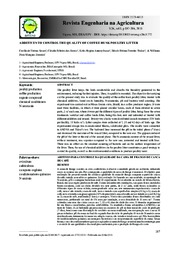Additives to control the quality of coffee husk poultry litter.
Additives to control the quality of coffee husk poultry litter.
Author(s): SOUZA, C. de F.; SANTOS, C. R. dos; INOUE, K. R. A.; TINÔCO, I. de F. F.; FERREIRA, W. P. M.
Summary: The poultry litter keeps the birds comfortable and absorbs the humidity generated in the environment, reducing the feet injuries. Then, its quality is essential. The objective for carrying out the present study was to evaluate the quality of the coffee husk poultry litter, treated with chemical additives, based on its humidity, N-ammonia, pH and bacteria total counting. The experiment was carried out in Minas Gerais state, Brazil, in a coffee producer region. It were used three facilities, in which it were placed circular boxes, each of them divided in seven parts, 2 m2 each one, where it were put the different types of poultry litter, being these the seven treatments: sawdust and coffee husks litter, being this last, new and untreated or treated with different additives and reused. Twenty-two chicks were distributed in each treatment (154 birds per facility, 11 birds m-2). Litter samples were collected at 7, 21 and 42 days of birds age. The experimental design was in randomized blocks, subdivided plots. The results were submitted to ANOVA and Tukey?s test. The hydrated lime increased the pH in the initial phase (7 days) and decreased the moisture of the reused litter, compared to the new one. The gypsum reduced the pH of the litter at the end of the second phase. The N-ammonia content of the reused litter, without treatment, was superior compared to the new one, untreated and treated with lime. There was no effect on the standard counting of bacteria and on the surface temperature of the litter. Then, the use of chemical additives in the poultry litter constitutes a good strategy to control its quality, as well as the environmental conditions to produce poultry meat.
Publication year: 2018
Types of publication: Journal article
Unit: Embrapa Coffee
Observation
Some of Embrapa's publications are published as ePub files. To read them, use or download one of the following free software options to your computer or mobile device. Android: Google Play Books; IOS: iBooks; Windows and Linux: Calibre.
Access other publications
Access the Agricultural Research Database (BDPA) to consult Embrapa's full library collection and records.
Visit Embrapa Bookstore to purchase books and other publications sold by Embrapa.

